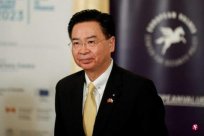(Washington News) U.S. media reports that Taiwan's election is an important issue for US Secretary of State Brillin to talk to senior officials in Mainland China during the visit of China.Beijing expressed concerns about the Democratic Progressive Party candidate Lai Qingde, and the United States reiterated not to interfere with the Taiwan election.
The Wall Street Journal reported on Monday (June 26) that people familiar with the matter revealed that mainland Chinese officials hinted to Brinken that the political position of Taiwan Vice President Lai Qingde may exacerbate the tension of the Taiwan Strait and further damage the relationship between Beijing and Washington.Beijing believes that Lai Qingde is a member of the Taiwan independence camp.
Lai Qingde once claimed to be "pragmatic Taiwan independence", and the outside world believed that his Taiwan independence advocated more aggressively than Cai Yingwen.
It is reported that Chinese officials obviously want to be able to fight for American cooperation.They mentioned to Brosky that in 2003, the US President Bush warned to then Taiwan Chen Shui -bian that the policy he promoted at the time threatened the current situation of the Taiwan Strait.
People familiar with the matter said that in the talks, Blingken was asked in the talks whether the United States regarded the DPP as a friend for the context of the Taiwan elections held in January next year.
In this regard, Blintken reiterated the position of the US government, that is, during the election of Taiwan, the United States will be impartial and do not support any intervention in the election process.
It is reported that Beijing is worried that Washington will try to lift Lai Qingde's election, while US officials will show signs of Beijing's intervention in Taiwan elections.It is also said that Tsai Ing -wen told US officials that as the election approaches, Beijing may strengthen its network attacks and other pressure on Taiwan.
People familiar with the matter said that Beijing's attention to Taiwan's issue is the main discussion point of Brincken's two -day visit to China, highlighting that the issue of Taiwan is at the center of the tension between the United States and mainland China.
Brosken visited China in mid -June, seeking to break the deadlock in the United States and China.In the two -day meeting, the two sides expressed their willingness to stabilize bilateral relations, but the contradictions in Taiwan and other issues were still obvious.
When meeting with Chinese officials, Blint emphasized the importance of maintaining peace and stability of the Taiwan Strait, reiterating that Washington did not support Taiwan's independence, and opposed any unilateral action to change the status quo of the Taiwan Strait.
Wang Yi, a member of the Political Bureau of the CPC Central Committee, Wang Yi, director of the Central Committee of the Central Committee of the Communist Party of China, and Qin Gang, the State Councilor and Foreign Minister Qin Gang, stated that the Taiwan issue is "the core of China's core interests."



